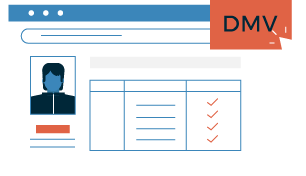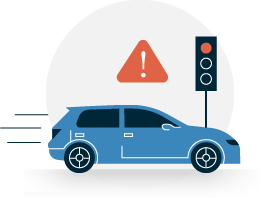INSURANCE POINTS
WHAT ARE INSURANCE POINTS AND HOW CAN YOU REMOVE THEM?
A Concise Overview
-Insurance points are a reflection of your driving record, which insurance companies use to help calculate your rates
-All but nine states currently use some kind of insurance points system
-Points will eventually drop off your record, but there are things you can do to reduce the number of points on your record, including taking a driver safety course
Insurance points are a key part of how auto insurance companies determine your rates. These points are an indicator of your driving risk based on your driving history.
How does car insurance work? When you apply for car insurance, your insurer will build as detailed a picture of you as possible, considering your driving history, the car you drive, when you drive, and how you store the vehicle.
Each of these things lets the insurance provider calculate how likely they are to have to pay a claim, and they will calculate rates to cover this risk. If you are determined to be a risky driver, the auto insurance company can demand you carry high-risk auto insurance.
Even if you have tickets or accidents on your record, you should still shop around for car insurance to get the best deal. Enter your ZIP code now to compare auto insurance quotes with insurance points.

Insurance points are a vital part of the calculation of auto insurance rates. These points are an indicator of your driving risk based on your driving history.
Because insurance companies are reluctant to discuss calculations, the nature of the insurance points system can be difficult to determine. Moreover, points systems vary from state-to-state, depending on the information that the state DMV collects on each driver.

What is certain is that each state keeps track of its drivers and assigns them driving report cards. This is a central part of what an insurance company uses to calculate risk when insuring a driver. You may receive insurance points for speeding or many other violations. So how can you find affordable auto insurance with insurance points?
WHAT ARE AUTO INSURANCE POINTS?

Insurance points are points added to your driving record by your state’s department of motor vehicles. The DMV in your state keeps a record of every violation (moving and nonmoving) as well as at-fault accidents and adds them to a record of your driving behavior.
What happens when you get auto insurance points?
When you apply for insurance, the insurance company will look at your DMV record for the number of insurance points you have; this will impact your insurance premium rates.

If your price is much higher than the initial quote offered, it is likely because the insurance company found evidence of several insurance points on your record.
- Similarly, if you do not declare any tickets or traffic violations, the insurance company will be able to find evidence on the insurance point record.
-
- Nondisclosure of the full information can lead to your policy being rejected or your rates being inflated even higher.

If you lie about your driving record, you are essentially committing insurance fraud. According to the Insurance Information Institute, you can be fined or face jail time if the auto insurance company pursues the charges. Insurance points, therefore, work as a permanent record of your driving, giving a considerable amount of information to insurers about the potential risk of insuring you. Although there are certain common factors across the country, the way insurance points work varies from state to state, so be sure to investigate your own state’s department of motor vehicles for specific details.
HOW DO YOU ACCRUE AUTO INSURANCE POINTS?

What you need to do to amass points on your insurance does vary from state to state, although certain commonalities will affect your record. Some states are less open about what they use to calculate your insurance points, and very few insurance companies will talk about the math involved.

However, what is certain is that transgressions of the law (and/or safety) will lead to a mark being placed on your record that will be visible to insurance companies.
How do reported violations affect your auto insurance points and rates?

The most obvious reason for an addition to your points on insurance is a traffic violation or accident that is reported to the police. The police keep a record of all collisions that cause more than a certain dollar threshold of damage (this varies from state to state but is usually around $1,000).
.

If you are determined to be at least partially at fault for this, you will get a mark on your insurance points.
Similarly, any moving or nonmoving violation carries the likelihood of insurance points, as does any single-car accident (i.e., if you crash into a tree).
How long does an accident stay on your record? It depends on where you live, but typically it will remain on your record for at least three-to-five years. More on this later.
Read more: How to lower your auto insurance rates?
FIRST OFFENSE

It’s generally understood that first offenses for a non-moving violation don’t go on your record. So, if you get a ticket for something like not being able to provide proof of insurance or a passenger without a seatbelt, you are unlikely to see it added to your permanent record.
Of course, if it is your second nonmoving violation or if you get caught for a moving violation, you will see it added to your record, but generally, there is a little bit of leeway for a minor first offense.
What other factors affect your auto insurance points?

Your insurance company considers a multitude of factors when assessing your insurance rates, and not all of them are driving-related.
You may, for example, see your rates increase if you have poor credit, as this has a strong correlation with requiring insurance companies to pay claims (since it is less likely you can pay for damages yourself). Learn how to buy cheap auto insurance for drivers with bad credit.
Although these aren’t the fault of your insurance points, they contribute to your insurance cost, so you should rule these out in advance of finding out your insurance points.
DUI

If you have received a DUI, OUI, or a DWI, this will certainly be added to your insurance points. These are classed as ‘major violations’ and are often the longest-lasting insurance points you can accumulate.
Getting a DUI or a DWI will also carry many other implications, such as the requirement to file an SR-22 insurance or pay higher insurance rates. You may also lose your license for a short period of time. Learn how to get auto insurance after a DUI.
-
- Even after your license is reinstated, your DUI will carry insurance points, meaning you will have higher insurance rates for the foreseeable future.
-
Are there exemptions?
Some states that assign insurance points to your record make certain exemptions for violations that will not result in points being added to your rates. For example, under the North Carolina Insurance Points and Driving Record program, an accident can mean three points being added to your record.
However, points will not be applied to your record after an accident if:
– There are no injuries (i.e., the accident only results in property damage)
– Damages total no more than $1,800
– You are not convicted of any moving violations as a result of the accident
– No other licensed drivers have moving violation convictions or have been in any at-fault accidents at the time of your incident
There are similar exemptions (with associated caveats) for speeding.
How much will your insurance rates increase with points on your record?
Exactly how much your insurance increases with points on your record will vary depending on your insurance company, where you live, and other factors. But to give you an idea of what certain traffic violations can mean for your insurance, take a look at this table.
Average Annual Auto Insurance Rates Based on Driving Record and Company
| Insurance Companies | Average Annual Rates With a Clean Driving Record | Average Annual Rates with One Accident | Average Annual Rates with One DUI | Average Annual Rates with One Speeding Ticket |
|---|---|---|---|---|
| USAA | $1,933.68 | $2,516.24 | $3,506.03 | $2,193.25 |
| Geico | $2,145.96 | $3,192.77 | $4,875.87 | $2,645.43 |
| American Family | $2,693.61 | $3,722.75 | $4,330.24 | $3,025.74 |
| Nationwide | $2,746.18 | $3,396.95 | $4,543.20 | $3,113.68 |
| State Farm | $2,821.18 | $3,396.01 | $3,636.80 | $3,186.01 |
| Progressive | $3,393.09 | $4,777.04 | $3,969.65 | $4,002.28 |
| Travelers | $3,447.69 | $4,289.74 | $5,741.40 | $4,260.80 |
| Farmers | $3,460.60 | $4,518.73 | $4,718.75 | $4,079.01 |
| Allstate | $3,819.90 | $4,987.68 | $6,260.73 | $4,483.51 |
| Liberty Mutual | $4,774.30 | $6,204.78 | $7,613.48 | $5,701.26 |
As you can see, increases in rates based on moving violations can vary widely by insurance company, though insurance rates increase to some degree in nearly every case.
DO ALL STATES USE AUTO INSURANCE POINTS?
While most states use a variant of the points system, nine states don’t use it. These states are:
-
HAWAI
-
KANSAS
-
LOUISIANA
-
MINNESOTA
-
MISSISSIPPI
-
OREGON
-
RHODE ISLAND
-
WASHINGTON
-
WYOMING
However, although these states don’t have the system of insurance points that leads to a cumulative record of your driving history, they do keep track of your driving violations. Repeated offenses may lead to the suspension of your license or financial penalties.
WHAT IS THE DIFFERENCE BETWEEN DRIVER’S LICENSE POINTS AND AUTO INSURANCE POLICY POINTS?

There is certainly an overlap between points on your license and insurance points in that both are essentially a record of traffic violations.
However, insurance points represent a ‘soft’ version in that they record your violations but don’t impact whether you can keep your license.

In states that use license points (which is most of them), regular transgressions will accrue license points that can then result in the temporary suspension of your license if you accumulate too many.

The actual rules on license points vary from state to state, but the points you get are dependent on the severity of your transgression (including a sliding scale of how fast you were speeding over the limit).
If you collect a certain number of points in a short period of time (two-to-five years), then you can have your license temporarily suspended. States generally set the limit to require around five transgressions within that period.

Insurance points don’t carry the same driving implications as license points, although they do impact the cost of your rates (as do license points). Either way, both are measures of driving transgressions, and both are best avoided for various reasons.
HOW LONG DO AUTO INSURANCE POINTS STAY ON MY RECORD?
Will your insurance points drop off? How long do points affect your insurance? It depends on these key factors:
-
The severity of the
transgression -
The policy in your
state -
Your insurance
company’s policy
- Your insurance company will usually examine your record for the previous two or three years to see if you have any violations.
-
- If your insurance company offers a ‘good driver discount,’ they may go back five years. If you are free from all violations during that time, you will be eligible.
As mentioned above, the severity of the transgression plays a significant role in shaping how long it stays on your record. This makes intuitive sense. It’s more important for your insurer to know you got a DUI three years ago than to know you couldn’t produce your insurance papers at a traffic stop three years ago.

Insurance points can remain on your record for an extremely long time, although it is unlikely to be as severe as the license points for a DUI in Florida, which has a 75-year expiration date.
As a general rule of thumb, unless your violation was for careless driving or a DUI, then it will most likely stay on your record for two or three years. You should see your rates drop after that point.
HOW DO YOU FIND YOUR AUTO INSURANCE POINTS?

The best way to find out the status of your insurance points is through your state’s DMV. Most states allow you to access your driving record through their website at no cost. Have a look at what is listed on the record.

If any of the information is incorrect, you should report it immediately to the DMV (and your insurance company). Having incorrect violations removed will decrease your insurance rates.

If you do have violations on your recent check, how long they will remain there depends on your state’s rules. You should also make sure to declare any violations when you are applying for insurance.
If they are on your state driving record, then the insurance company will have access to them, and they will seriously penalize you if you fail to declare something.

Knowing how to check insurance points on your driving record is very important. You can also access your driving record through a third-party private company. The upside of doing this is that they will often be able to process the information for you more quickly than your own state’s DMV (particularly if your state does not allow you to check online).

The downside of this approach is that it will cost additional money, and it will also carry a risk since you’ll be required to share your social security number and driver’s license number with a private company. It is therefore strongly recommended that you use your state DMV wherever possible.
HOW DO YOU REMOVE INSURANCE POINTS FROM YOUR RECORD?

Can you take a driving course to remove insurance points from your record?
In some instances, depending on the state and your transgression, you may be able to remove insurance points from your driving record by taking an approved driving course.
These courses are usually based on teaching safe driving practices and can either remove points from your record or prevent them from going on in the first place. Where possible, you should take this option.

As mentioned above, points are eventually expunged from your record over time. Therefore, regardless of the violation, just waiting will result in the points being removed. However, this runs the risk of allowing time for more points to build up, so you should also take active steps to improve your driving in the interim.

Insurance companies are more commonly offering violation forgiveness policies. These programs work by adding a small amount to your rates and guaranteeing no rate increase in the instance that you receive a minor traffic violation.
These policies can be extremely cost-effective for drivers who regularly get traffic violations, as the average rate increase is usually less than $5 per month for violation forgiveness.

This won’t remove points but will effectively negate their impact on your insurance rates. You won’t be free to accrue as many as you like, nor should you risk a major violation, but it will mitigate the impact of insurance points.

Insurance points are something of an opaque process. It is never clear exactly how insurance companies factor them into the calculations of your insurance rates, nor is it precisely clear how far back they go when working out your driving history.
However, some things are constant: it is better not to have violations on your record.

However, being savvy about the situation is the best way to mitigate any problems.
















